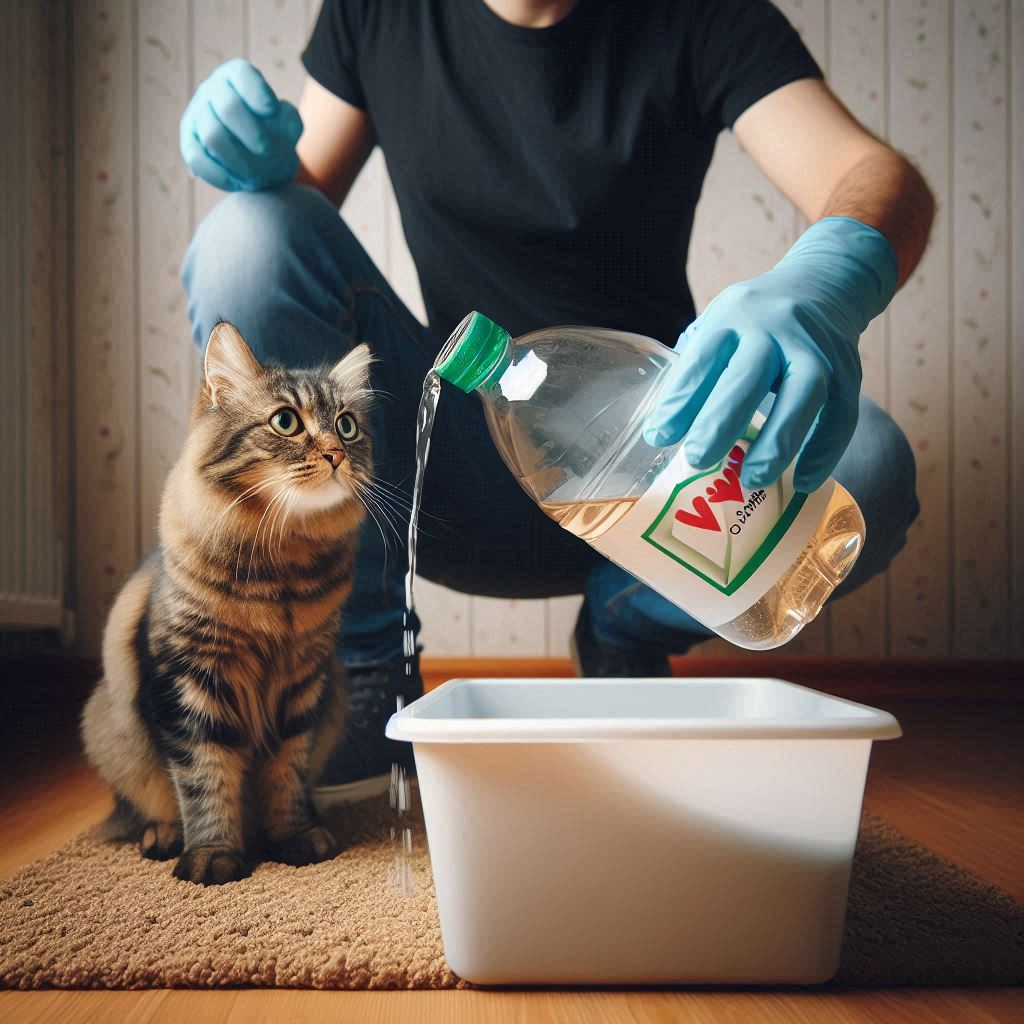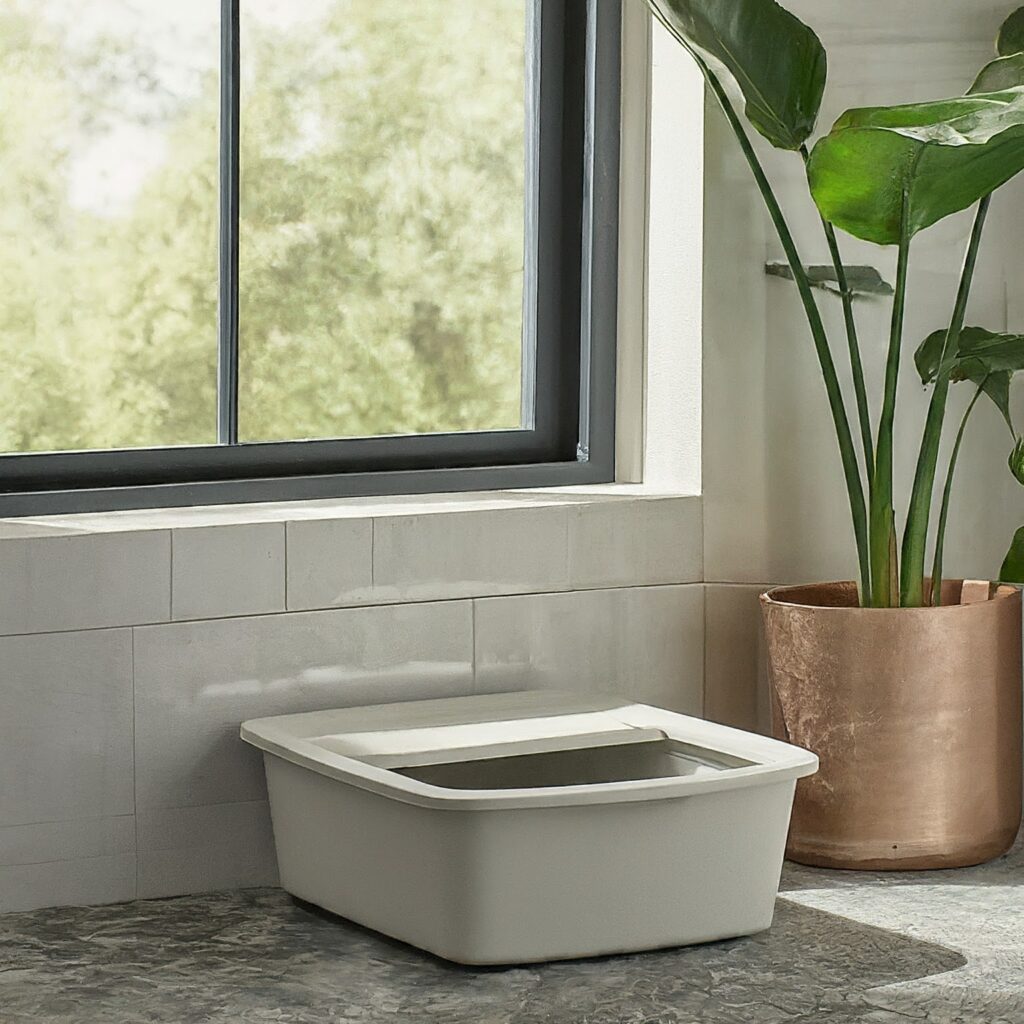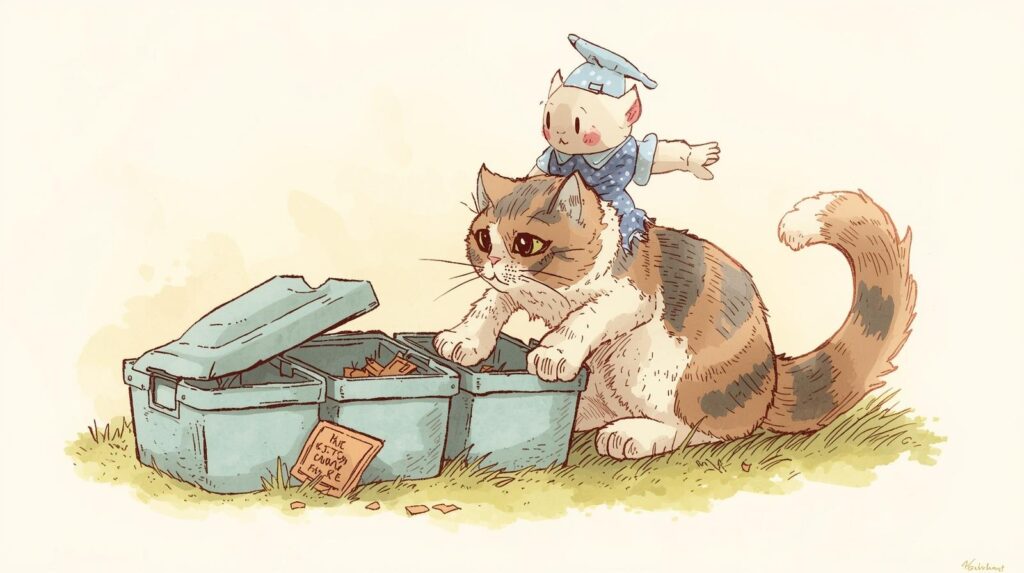Vinegar, particularly white vinegar, is a popular and eco-friendly cleaning agent that many cat owners use for litter box maintenance. Its natural acidity can help break down certain types of cat litter and neutralize odors, making it an effective solution for general litter box cleaning and managing occasional litter clumps. Below is a detailed guide on how vinegar can help with cleaning cat litter, its effectiveness on different litter types, and tips for a cleaner, fresher litter box.

1. How Vinegar Interacts with Cat Litter
- Acidic Breakdown: Vinegar’s acetic acid content is mild but effective enough to break down residues and light clumps in certain types of litter, especially biodegradable or clumping varieties. This makes it useful for dissolving minor accumulations and reducing odors.
- Not Effective for All Litter Types: While vinegar is great for many cleaning purposes, it’s not effective on all cat litters, particularly dense clay-based litters that resist dissolving even with strong acids. For these types, soap and water or enzymatic cleaners may be better alternatives.
- Odor Control: Vinegar neutralizes ammonia and other foul-smelling compounds in cat urine, helping to maintain a fresh litter box environment without harsh chemicals.
Also Read: Why Do Cats Watch You Clean Their Litter Box?
2. Step-by-Step Guide to Using Vinegar in Litter Box Cleaning
- Gather Supplies: You’ll need white vinegar, warm water, a spray bottle, a scrubbing brush, and a soft cloth or paper towels.
- Empty and Rinse: First, empty the litter box of any remaining litter. For a thorough clean, rinse it with warm water to remove loose debris.
- Apply Vinegar Solution: Mix equal parts white vinegar and water in a spray bottle, then spray generously inside the litter box. Let it sit for 5–10 minutes to break down residue and reduce odors.
- Scrub and Rinse: Use a brush to scrub any stubborn spots. Rinse thoroughly with warm water to remove vinegar residue, which may deter some cats due to its strong scent.
- Dry and Refill: After drying the box, refill it with fresh litter. For added freshness, sprinkle a thin layer of baking soda at the bottom before adding litter to further control odor.
Also Read: How to Empty a Cat Litter Box: Step-by-Step Guide for Cat Owners
3. Benefits of Using Vinegar for Cat Litter Maintenance
- Eco-Friendly and Safe: Vinegar is a natural, non-toxic cleaner, making it a safe choice for households with pets and children. Unlike bleach or ammonia, it won’t release harmful fumes.
- Affordable and Accessible: White vinegar is inexpensive and widely available, making it a practical choice for routine litter box cleaning.
- Kills Bacteria and Fungus: Vinegar’s antimicrobial properties help reduce bacteria, keeping your cat’s environment healthier and potentially reducing the risk of infections.
Also Read: Cat Pee Turns Litter into Mud | Reasons & Solutions
4. Considerations and Limitations
- Vinegar Scent Sensitivity: Cats have a strong sense of smell and may initially dislike the vinegar scent. Rinse thoroughly to avoid lingering odor that could discourage litter box use.
- Not a Substitute for Deep Cleaning: While vinegar is effective for light maintenance, deep cleaning clay-based or heavily soiled litter boxes may require other cleaning agents.
- Avoid Direct Contact with Litter: For litter spills on floors or carpets, it’s better to clean with dry methods first to prevent litter from clumping and sticking. If needed, a light vinegar spray can help remove the final residue.
Do’s and Don’t for Vinegar Litter Cleaning
1. Is Vinegar Effective for All Types of Cat Litter?
- Different Types of Cat Litter: A breakdown of the common types of cat litter—such as clumping clay, silica gel crystals, and biodegradable options—and which types respond best to vinegar.
- Biodegradable Litter: Vinegar’s mild acidity can help break down litter materials like paper or pine pellets, which makes it particularly useful for biodegradable options.
- Why Vinegar May Not Work on Clay-Based Litter: Clumping clay litter resists most dissolving agents, so a solution like hot water and soap might be more effective for these types.
2. Can Vinegar Prevent Litter Box Odors?
- Odor-Neutralizing Power: Exploring how vinegar’s natural acidity breaks down ammonia from cat urine, helping to neutralize odors effectively.
- Comparison with Baking Soda: Discuss the combined use of baking soda with vinegar to control litter box odors without creating any health hazards.
- Tips for Long-Term Odor Control: How regular vinegar rinses can create a fresher, long-term odor-free environment, especially in multi-cat households.
3. Cleaning Cat Litter Spills on Hard Surfaces with Vinegar
- When Cat Litter Sticks to Surfaces: Tips for removing stuck or caked litter from floors or surfaces using vinegar’s dissolving power.
- Step-by-Step Spill Management: From vacuuming dry litter to scrubbing leftover residue with vinegar, this section will detail effective ways to clean hard surfaces.
- Avoiding Common Mistakes: Discuss why using vinegar directly on some clumping litters can worsen the mess and when it’s better to let spills dry before cleaning.
4. Is Vinegar Safe for Cats in the Long Run?
- Pet Safety and Vinegar Use: Explaining why vinegar, when rinsed properly, is safe for regular litter box cleaning.
- Precautions for Sensitive Cats: Some cats are sensitive to strong smells, so rinsing thoroughly can ensure they remain comfortable.
- Eco-Friendly and Pet-Safe Alternatives: For cat owners looking for alternative solutions, this section could cover other natural cleaners compatible with pets.
5. The Benefits of Routine Litter Box Maintenance with Vinegar
- Reduced Bacterial Growth: Highlight vinegar’s antibacterial properties and how a regular vinegar cleaning schedule can reduce bacterial buildup.
- Enhanced Litter Longevity: Regularly using vinegar can help extend litter freshness, potentially saving money and litter box cleaning time.
- Routine for Multi-Cat Homes: Explain how routine maintenance, with vinegar as a regular agent, can be especially helpful in homes with multiple cats.
5. Frequently Asked Questions
- Does Vinegar Fully Dissolve Cat Litter?
No, vinegar softens and breaks down minor clumps but is not strong enough to dissolve clay-based litter completely. It works best on biodegradable litter or light cleaning tasks. - Is Vinegar Safe Around Cats?
Yes, vinegar is generally safe around cats when properly rinsed after cleaning. However, cats should not ingest concentrated vinegar, as it could upset their stomachs. - Can Vinegar Be Used Daily?
A diluted vinegar solution can be used weekly for odor control, but daily use isn’t typically necessary. Daily scooping and spot-cleaning are sufficient for regular upkeep.
Additional Tips for a Fresh and Clean Litter Box
- Use Baking Soda: A thin layer of baking soda under the litter can help absorb moisture and control odor without disrupting your cat’s routine.
- Invest in High-Quality, Low-Dust Litter: Low-dust litters reduce airborne particles and help maintain a cleaner, fresher-smelling area around the litter box.
- Keep the Litter Box in a Ventilated Area: Proper ventilation helps prevent odors from building up and improves air quality around the litter area.
- Consider Enzyme Cleaners for Deep Cleans: Enzymatic cleaners can help break down stubborn waste residues, especially for multi-cat households or particularly odor-sensitive cats.
Using vinegar to clean cat litter can be an effective, safe, and affordable way to maintain a pleasant and hygienic space for your cat. With these tips and a little regular upkeep, your cat’s litter area will stay fresh and inviting without harsh chemicals.


